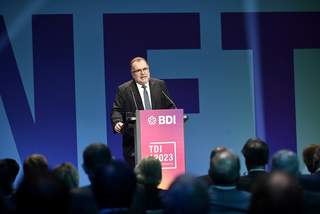
BDI President Siegfried Russwurm at #TDI23 – Day Of Industry © Christian Kruppa
Day Of Industry: Germany is falling behind, no economic recovery without structural reforms
"The BDI expects to see a sobering plus or minus zero percent for the gross domestic product in 2023 compared to the previous year," said BDI President Siegfried Russwurm at the Industry Day in Berlin on Monday.
The BDI forecasts GDP growth of 2.7 percent for the global economy, which would be a full percentage point less than the average of the past 20 years. "Still, a plus 2.7 globally and zero for us clearly says: Germany is falling behind," Russwurm emphasized. He sees brakes on growth primarily in investment behavior, which has deteriorated massively, as well as structurally in the country’s labor shortage, a major problem in many industrial sectors.
"We expect to see an increase in investments in equipment, patents, and licenses, for example," Russwurm said, “but due to the sharp decline in construction investments, which account for slightly over half of the gross fixed asset investments, we’ll end up with a negative total."
According to the BDI president, a noticeable recovery in the overall economy will at best begin in the coming year. However, conditions are expected to remain difficult due to a variety of challenges like the aging population, the fight against inflation, global political tensions with related higher costs for resilience, and high upfront investments in climate-neutrality and the digital transformation.
Those who believe the energy transition could become the nucleus of a new economic miracle underestimates the fact that investments will largely only replace existing assets and, for the most part, at much higher cost. "This certainly won’t bring us additional economic growth for the time being. An economic upswing doesn't come on its own. So, there’s no all-clear for Germany as an industrial location. On the contrary: Germany faces a mountain of major challenges. Policymakers must systematically tackle structural reforms," warned the BDI president.
"A feeling of impatience and uncertainty is spreading among many entrepreneurs. More and more German companies, including small and medium-sized enterprises, are considering shifting parts of their value creation out of Germany because domestic costs, speed and bureaucracy are simply not acceptable for them in comparison," Russwurm warned. "We need better tax conditions for investments in Germany, and we need them now, not sometime in the future. When will the promised sense of proportion in our regulations finally become a reality? We also need to speed up planning and approval procedures to stimulate investments."
Russwurm sees huge challenges ahead in restructuring the country’s energy supply. "The BDI expects the government to quickly come up with a concept that can be implemented and that ensures a secure, long-term supply of electricity at internationally competitive costs. The many state-induced burdens such as taxes, surcharges and network fees must be reduced to make electricity more attractive than fossil fuels," demanded Russwurm. Equally urgent is the need to build the necessary infrastructure and expand the supply of electricity. The delta between ambition and implementation is growing by the day. This is particularly evident in the sluggish expansion of wind power in Germany. "Rather than installing four or five wind turbines per day, as the chancellor also believes is necessary now, just one wind turbine was erected per day in the first half of this year," said Russwurm.
The BDI president drew attention to the complexity of German-Chinese relations. Referring to the upcoming government consultations, he noted that "a decoupling from China would be unrealistic and damaging. What we need is decisive de-risking. Companies are working intensively to strategically diversify their sales and procurement markets and build new partnerships."
China, he said, is both a systemic rival and an economic and a technological competitor. Inevitably, however, the country is also an indispensable partner in the fight against climate change. "We need to maintain a dialogue with China on climate protection as well as on trade and investment relations," stated Russwurm.
This year's Industry Day was a two-day hybrid event. On site at the Verti Music Hall Berlin, more than 1,000 representatives from business, politics, society, and science exchanged views on industrial policy challenges for Germany as a business location. Speakers included Chancellor Olaf Scholz, Minister for Economic Affairs and Climate Action Robert Habeck, Minister of Finance Christian Lindner and Minister of Education and Research Bettina Stark-Watzinger. Other presentations were given by NATO Secretary General Jens Stoltenberg, the French Secretary of State for Europe, Laurence Boone, the Norwegian Minister of Trade and Industry, Jan Christian Vestre, the Chairwoman of the Defense Committee, Marie-Agnes Strack-Zimmermann MdB, and the Chairman of the CDU, Friedrich Merz MdB.
TDI 2023 was held in cooperation with Deloitte and other partners.



